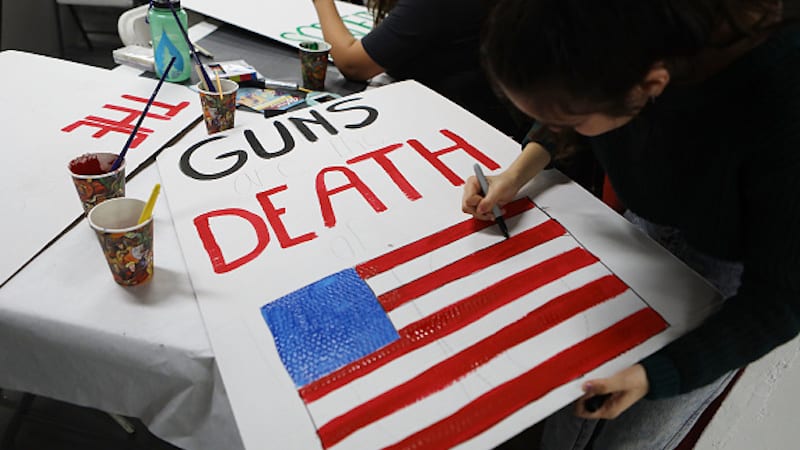Teachers are scared, frustrated, and as divided as the rest of the US on the topic of gun violence in schools.
Few, if any, entered education with the dream of someday defending a classroom with a gun. But in the US in 2018, the idea of armed teachers in the classroom isn’t a fantasy. It’s an actual policy proposal that is currently under consideration in at least ten states.
And no wonder. There’s already been another school shooting since the February 14 massacre at Marjory Stoneman Douglas High School in Florida.
WeAreTeachers recently asked 412 K–12 teachers for their thoughts on gun violence. The vast majority—like the majority of teachers in the US—work in public schools. Forty percent teach in suburban schools; nearly 30 percent serve in urban schools and 21 percent in rural schools. Thirty-seven percent of our respondents self-identify as Democrats, 32 percent as Republicans, and 21 percent as Independent.
Here’s what they told us about gun violence. You can check out our video, too.
https://www.facebook.com/WeAreTeachers/videos/10156349432308708/
Most teachers feel safe in their schools, but stress is taking a toll.
Almost 19 percent of surveyed teachers feel “extremely safe” in their schools; 54 percent feel “moderately safe.” Most aren’t concerned about gun violence in their school. Yet 67 percent worry about gun violence in the community.
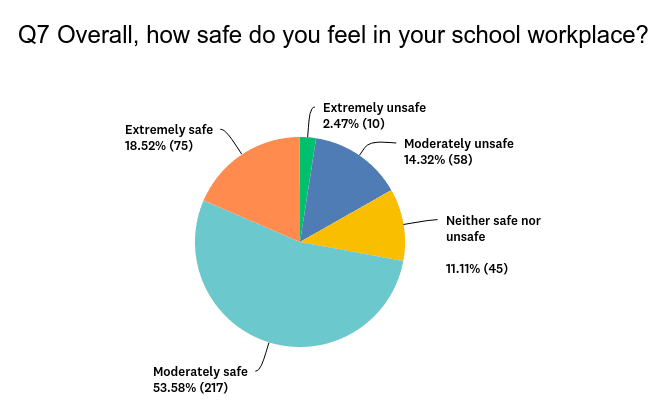
SOURCE: WeAreTeachers March 2018 Survey
Most educators view their schools as safe spaces. But the chance that their school might be the site of the next school shooting is also on their minds. The National Education Association (NEA) surveyed 1000 of its members nationwide in the first week of March. Their survey showed that 60 percent of respondents worry that there could be a mass shooting at their school.
Uncertainty and fear are causing such distress that some teachers are thinking about leaving education. One teacher surveyed by WeAreTeachers wrote, “I’m planning to leave the classroom. There is not even basic assurance that children and teachers can go to school and know they will come home.” Another said, “Teachers are overworked and overstressed already … I am currently looking at other professions and am looking into homeschooling my children, who are also scared to go to school.”
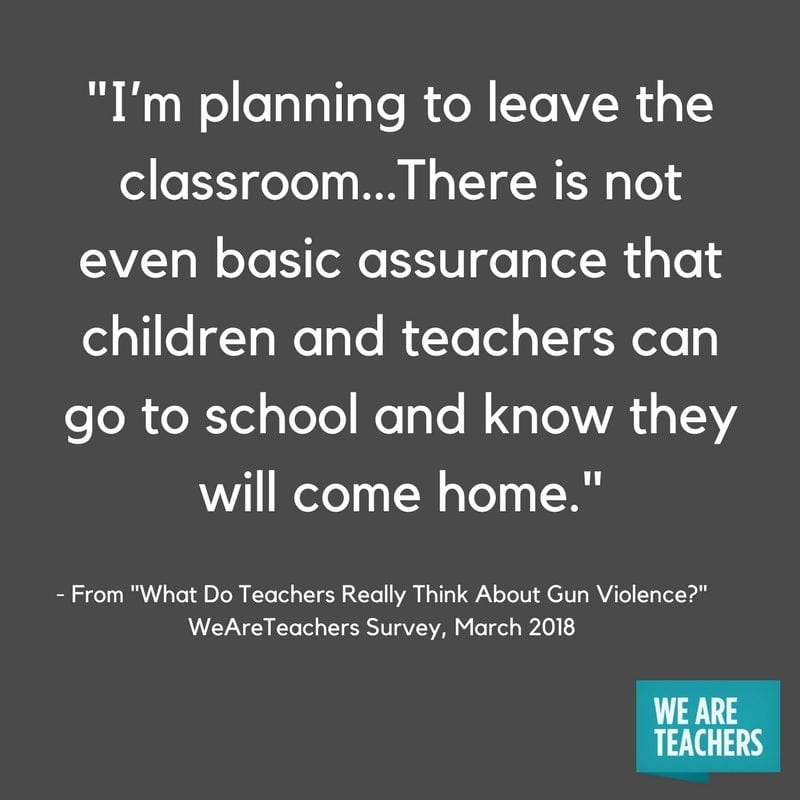
Teachers want—but aren’t getting—professional development to help them support at-risk students.
Teacher training on supporting at-risk or troubled students is the gun violence prevention strategy that has the most support from teachers. Yet it is rarely discussed in the public sphere. A full 93 percent of teachers surveyed for WeAreTeachers “support” or “strongly support” this strategy. But most say that their schools do not offer such training. Approximately a third told us their schools “never” offer training. Forty-seven percent said they receive training regarding at-risk students “once or less than once per year.”
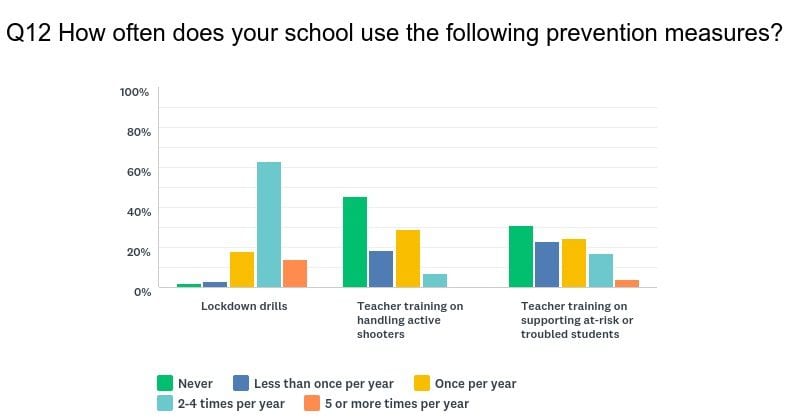
SOURCE: WeAreTeachers March 2018 Survey
But teachers work with at-risk students daily. “We deal with students in crisis or suffering from PTSD from domestic violence all the time,” one teacher wrote. “They need counseling, staff support, and restorative justice to learn to deal with pent up emotions.” Another identified “resource teachers for at-risk students, psychologists to diagnose students quicker, counselors to help those students needing support, and more teachers/teacher’s aides to get to know students” as possible interventions.
Teachers think increased social support could decrease gun violence.
“I think that cuts to public services, such as mental health, housing, and outreach, only increase the strain on communities and leave us vulnerable to more violence,” said one teacher. They also added, “Please stop focusing on the right to bear arms and start focusing on every community’s right to live safely and prosperously.”
Teachers regularly interact with students and families who are unable to access much-needed social services, including mental health care. They do what they can to meet students’ physical and socio-emotional needs. However, they lack the proper training and resources to address complex issues, such as domestic violence, substance use, and poverty.
Teachers support lockdown drills but aren’t sure if lockdowns can keep students safe.
Ninety-five percent of surveyed teachers “support” or “strongly support” lockdowns as a gun violence prevention measure. Most (92 percent) told us that their schools regularly practice lockdown drills. But some wonder if hunkering in place is the best strategy in case of gun violence.
“I have seen videos saying it would be best to hide kids in all areas of the room, and distract the shooter by throwing things at him, but we are still trained to just have lights out and all kids up by the front out of sight,” said one teacher. “If this really is the best procedure, I would like to see some recent research.”
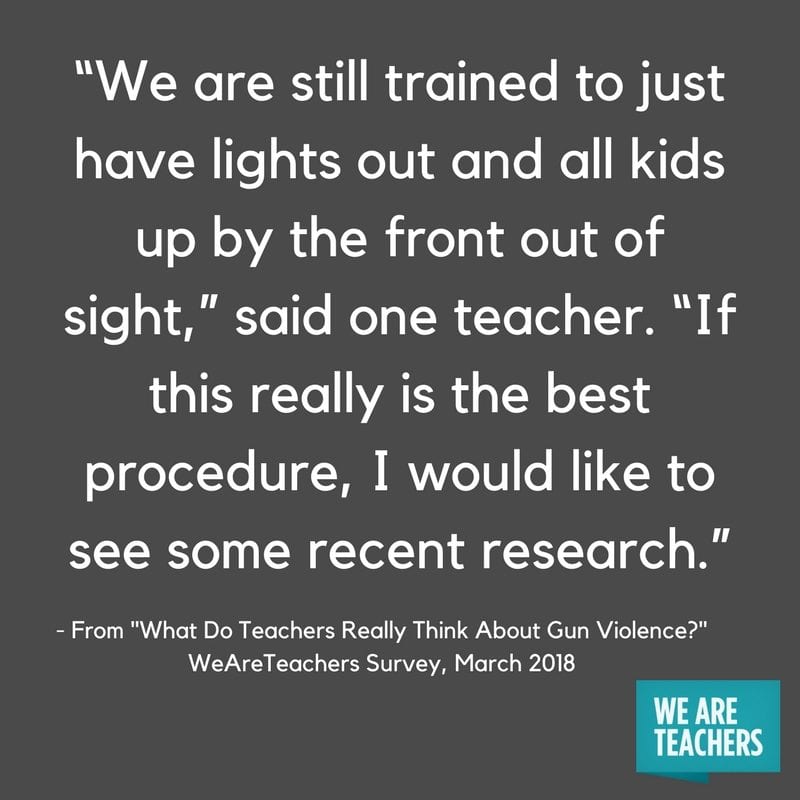
The quest for safety has led many teachers to support strong school security measures. Approximately 68 percent of respondents “support” or “strongly support” armed security guards in schools. Eighty-five percent “support” or “strongly support” police patrols. Fifty-seven percent “support” or “strongly support” metal detectors in schools.
Some teachers, though, worry about the impact of such tight security. “Schools need to be safe havens,” one wrote, “not hardened fortresses.”
Most teachers don’t want guns in school, but many support the idea of arming willing educators.
According to a recent survey by the NEA, 78 percent of educators oppose the idea of arming teachers and other school staff. And a March 2018 Gallop poll of nearly 500 teachers found that approximately three-quarters of teachers expressed opposition to the idea.
But only 57 percent of teachers surveyed by WeAreTeachers “oppose” or “strongly oppose” arming teachers, with individual responses ranging from, “It is insulting to ask teachers to train to carry weapons for their students’ protection before basic gun controls are put in place” to “In order for me to feel safe, I need to know multiple people on my campus volunteered to go through gun training and safety and are armed to protect us.”
Some teachers think that armed educators will prevent violence. “Schools have become targets because killers know they will be very successful because there is no one there to stop them,” one teacher said. Others believe that guns in schools might increase the risk of violence. “As a two-time expert marksman, I fear untrained, unprepared armed teachers more than an assailant,” a teacher said.
Statistically-speaking, teachers support gun control measures, but they’re strong supporters of the Second Amendment as well.
Gun control measures that received strong support from WeAreTeachers survey respondents include preventing the mentally ill from buying guns (93 percent “support” or “strongly support”), banning gun purchases by people on no-fly or watch lists (88 percent), background checks for private and gun show sales (93 percent), banning assault weapons (69 percent), and creating a federal database to track gun sales (76 percent).
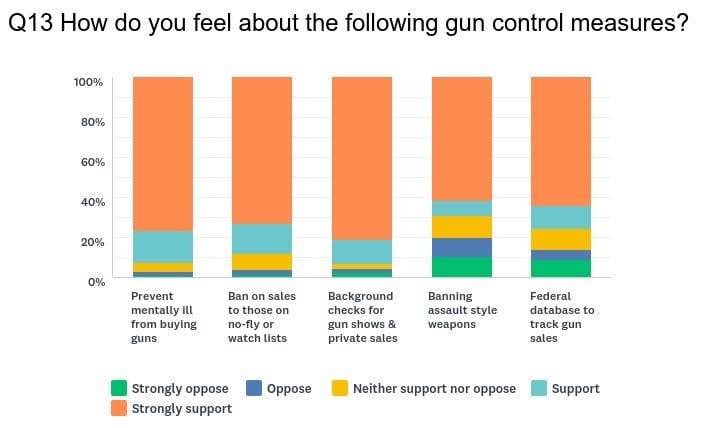
SOURCE: WeAreTeachers March 2018 Survey
These numbers mirror those reported by the NEA, which reports 91 percent support for restricting mentally ill people from purchasing guns and 85 percent support for an assault weapons ban.
Yet a not-insignificant number of teachers firmly believe that additional gun regulations will limit personal freedom without measurably decreasing gun violence. One wrote, “Taking away our constitutional right to bear arms will not stop shootings.” Another said, “We have gun laws on the books that have been ignored. Violators of laws should be punished rather than demonizing law-abiding, gun-owning, responsible citizens.”
In fact, if teachers agree on anything regarding gun violence, it’s that gun laws alone will not solve the problem. As one teacher stated, “The strongest weapon we have against gun violence is people caring about people and reaching out to others. … Charity and generosity to those in need heal hearts, offering them hope and consolation. That is the type of solution we need in our schools and families.”
We’ll be continuing the conversation on gun violence in schools in our WeAreTeachers Chat Facebook group. We’d love to hear what you think. Please come and share your thoughts.

